
|
|
In Memory's Eye (Part 1) John Ward Preface As one who had the privilege of serving in the Canadian House of Commons, observing, hearing, and reporting the speeches of its Members over a period of thirty-five years, this volume seeks to reflect the impressions certain occupants of the Commons Chamber made upon the author. During that time some representatives of the Canadian people rose to great heights, became Cabinet Ministers, Prime Ministers, historical figures shaping the destiny of future generations. Their lives and their works form the stuff of study by historians, biographers, and social commentators. Their names appear on plaques and statues, their signatures on state papers and international treaties. Other Members of Parliament never achieved such public recognition, but are deserving of remembrance for their service to their country. "In Memory's Eye" attempts to give a human face to Members in both classes, those who achieved prominence and those who occupied seats in the back benches, in relative anonymity save in their own ridings. The known and the unknown populate its pages. Their backgrounds vary, some being fourth and fifth generation Canadians, others whose birth places were overseas, Russia, Ukraine, New Zealand, Ireland, and elsewhere. They are seen from a vantage point unique in the perspective it provided, the Hansard reporters' desk in the centre of the aisle dividing Government and Opposition on the floor of the House of Commons, and from the Hansard editorial offices on the third floor of the Centre Block on Parliament Hill. Normally a part of the furniture, seen but unseen, the people of Hansard devoted their talents to reporting the speeches and interjections of Members engaged in debate, editing out gross ungrammatical errors while retaining meaning and accuracy, and publishing the daily Official Report known in legislatures the world over by its unofficial name, Hansard. Over the years the people of Hansard became attuned to the accents, nuances, and speaking styles of many Members. In turn, many long-serving Members, who valued Hansard and depended on it, came to know its staff and regularly visited its offices while checking the unrevised transcripts of their speeches. "In Memory's Eye" charts some of this interaction. It does more. It offers insights to little known facets of the lives and careers of Members of Parliament as they carried out their duties as representatives of the Canadian people, dedicated to public service on behalf of their constituents and their country. It is written by one who daily saw Members, Ministers, Prime Ministers, and Speakers of the House, partake in the affairs of Parliament from their first to the last day in it, reported and edited their maiden speeches and their farewells. Before becoming a member of the Canadian Hansard staff I served in a similar capacity in the Parliament of Ireland, the Dáil, and thus have a background of experience in parliamentary reporting in two countries. Upon that experience I rely in placing this volume before the Canadian public in the hope that it may lead others, students especially, to undertake a compilation of the lives of local Members of Parliament who have given of themselves in preceding generations. Canadian parliamentary history is fundamental to knowing how Canada passed from colony to independent country, its way of life, freedoms, rights and opportunities the envy of the world. John Ward
Honourable Members Somehow my memories of life in Hansard are tinctured with an overabundance of encounters with honourable members dutifully elected by the inhabitants of British Columbia to represent them in Canada's capital, Ottawa. When I first joined the staff in 1960, those members were slowly emerging from a time when their attendance in Ottawa was governed by the railway systems, Canadian National and Canadian Pacific. Because it took them three days to travel by train each way, back and forth between Vancouver and Ottawa, each round trip took a week to complete, and sometimes more if they happened to represent ridings in the hinterland of the province, or on Vancouver Island. The same, of course, applied in varying degrees to members from the Atlantic Provinces. As a result, parliamentary sessions were geared accordingly, usually only one per annum, and honourable members from east and west stayed put in Ottawa for the duration of a session, a hardship for many, an escape for some, depending on their marital circumstances. Here my observations are restricted to the male members, who were in overwhelming numbers in relation to the few females serving as Members of Parliament. For weeks and months at a time members were condemned to endure the humidity of Ottawa summers, or the icy cold of Ottawa winters. Which was the worse it was hard to say. Air conditioning in summer was totally absent from the Centre Block where most members had their offices, and where the House of Commons Chamber became sweltering hot as the summer months progressed. Once inside the thick walls of the building, the heat had no way of escaping. All in all, it was the devil and all to keep a dry shirt throughout the day. On a personal note, I remember dashing home to my apartment to change shirts during the supper-hour adjournments, only to find the fresh shirt clinging to my back in less than half an hour. In winter, honourable members and those others of us located in the committee reporting section in the West Block, had to don winter boots, hats, scarves and gloves to trek across the snowy, blowy waste that separated us from committee meeting rooms in the Centre Block. There we would divest ourselves of our winter garb, perform our assigned tasks, put on our winter boots, hats, scarves and gloves, and trudge back to the West Block, only to repeat the process every hour or half hour in the case of reporters. I think the western members from the lower mainland of British Columbia had the worst of it, not being acclimatized either to the humid heat or the piercing cold. All that was to change during my tenure on Hansard, first with the advent of air travel by Trans Canada Airline, later to become Air Canada, and by Canadian Pacific Airline. Honourable Members could return on brief visits to their ridings, families and constituents during sessions which, with the growth of parliamentary business, extended year round, with short breaks at Christmas and Easter, and a lengthy summer recess. Also in the course of time an underground tunnel was built between the West Block and the Centre Block. During its construction a whistle sounded whenever rock was to be blasted away throughout the day, followed by the sound of exploding dynamite which reverberated throughout the West Block.
Time and again he treated the House to a verbal treatise on the merits of the Kettle Valley Railway. Time and again he recited the route taken by the Kettle Valley Railway. Time and again he reeled off the names of towns, villages, and hamlets served by the Kettle Valley Railway. Pity the hapless Hansard reporter whose ten-minute shorthand stint covered that portion of the honourable member's speech, and was obliged to verify the spelling of those place names in the far off Kootenays. They might as well have been in the far off Himalayas. Bert Herridge was a veteran of the CCF, the Canadian Commonwealth Federation, precursor of the New Democratic Party. English by birth, he had suffered a severe hand injury in the First World War, an injury he covered up by wearing a black glove on that hand at all times. As age crept up on him, his face showed new lines, new wrinkles, but his spirited advocacy for the Kettle Valley Railway never lessened. Nor did his passion for amateur theatricals. My last memory of him is of a Christmas party held by the New Democratic caucus in Room 118N, on the ground floor of the Centre Block. A skit was staged in which the elderly Bert, in drag, played the part of an elderly female. He enjoyed the role just as much as his audience enjoyed him. The honourable member and his beloved Kettle Valley Railway, both long gone, are now part of Canadian history.
Mr. Winch was a frequent habitué of the Parliamentary Press Gallery shebeen when that was the only place on Parliament Hill where liquor was obtainable by members of both the Gallery and the Commons, and by a small circle of House officials. It may seem almost unbelievable, but in those times Parliament Hill was a "dry" fortress, and had been so for decades. Not even the Parliamentary Restaurant served "beverage" with meals, a taboo that was only broken when Maurice Ollivier, the Law Clerk, walked in one noon, placed a bottle on his table and asked for a glass with which to drink its contents, wine. Looking back, the climate of the times lent itself to a greater abuse of alcohol by the denizens of the Hill than is the case today, when the Restaurant offers a wine list to its patrons, and a licensed liquor store occupies part of the premises. In those earlier days the Commons messenger staff ferried brown paper bags of whiskey, rum, and other potent draughts from downtown Ontario Liquor Control Board outlets to Members' offices as part of their normal duties. To return to Mr. Winch and his association with Hansard, I remember one prorogation vividly. A number of us were whoopin' it up in the Press Gallery Saloon, run by the affable George Gagnon, when Harold, "call me Harold", wandered in. The talk had been the usual end-of-session gabble about Members and their speaking habits. As we felt peculiarly suited to measure the oratorical skills of those whose every utterance we reported in shorthand on a daily basis, he basked in our assurance that he was a most effective speaker on the floor of the House. And we told him why. He was brief, he spoke clearly, he commanded attention. Such encomiums had an unexpected effect. "When the House resumes, I'll ask a couple of you to our (NDP) caucus. You can give them a few tips on speaking!" If it had ended at that, all might have gone well. Unfortunately, and I really believe it was an unfortunate happening, a first-time Member from British Columbia had joined the group and had been listening to the conversation. As a speaker he was, putting it politely, woeful. He believed that everything that could be said should be said about whatever topic was being debated. And, being subject to time limits, he said it all, without inflection, without emphasis, in monotone, at 280 words a minute. Nobody really listened. He was intense, made sense, but could not connect. Woeful he was to those he was addressing, and woeful to us, compelled to match his speed in talking with our speed in shorthand. And, it being end-of-session, we told him so. Out of the goodness of my heart I assured him he would be more attentively received if only he would vary his delivery, and stop when he had made his point. A few weeks after the new session began he was on his feet, in full flight as usual, as I entered the Chamber. In the best of all worlds, a Hansard reporter is as unobtrusive as can be, part of the furniture, seen but unseen. Alas, in mid sentence, the Member noticed me out of a corner of his eye as I walked in, stopped speaking, and sat down. His confidence was shattered. Rightly or wrongly, I have blamed myself ever since. The young member lost his seat in the next election, and thereafter forsook political life. Whatever the reason may have been, Harold Winch's invitation never arrived. And closure by Hansard reporter was never repeated. A closing note may add a certain poignancy to this brief account of Harold Winch's public career. Politics is a cruel profession. The hard knocks it gives to those who engage in it are sometimes exceedingly hard to absorb and overcome. It was during his earlier political career in British Columbia that he suffered such a fate. Following a defeat of the provincial government in the legislature at Victoria, he, as Leader of the Opposition, might well have been consulted on the possibility of forming a government led by himself. The Lieutenant-Governor chose not to consult him, and his party lost the ensuing election. It is believed that he never quite recovered from those two blows inflicted in quick succession. To those who knew him in Parliament in Ottawa, he was always a gentleman.
With such a background much was expected of him. Some saw him as the first son of British Columbia with a good chance of one day becoming Prime Minister. He was a westerner, a war veteran, and represented a new generation of Canadians, those of the immediate post-war era. But a veteran of the First World War stood in his way, John George Diefenbaker, also a westerner, who had paid his political dues in full and went on to capture the coveted post. In the Commons Fulton was a good speaker with a command of good English, a Hansard reporter's delight. Shut out from any chance of succeeding Diefenbaker as leader of the federal Progressive Conservative Party, he returned to his native province where he was elected leader of the provincial Progressive Party, doomed to lose against the governing Social Credit Party let by W. C. ("Wacky") Bennett. Fulton was a Canadian who served his country well in peace and war. In politics his was a story of what might have been.
Two other British Columbia members who made their mark in the Commons in the early 1960's were the Hon Howard Greene (Vancouver Quadra), and Erhart Regier (Burnaby Coquitlam). Two more different personalities could not be imagined. Greene was patrician in bearing and speech, and served as Secretary of State for External Affairs in Diefenbaker's cabinet; Regier was an earnest, hard-working member of the Cooperative Commonwealth Party and the New Democratic Party. Greene spoke in remarkably low tones. In contrast, Regier's voice sounded harsh. It was left to Regier to provide a remarkable example of self-effacement, one not often seen among politicians, by resigning his seat to make way for the entrance of Tommy Douglas as Leader of the New Democratic Party. Douglas went on to press the minority governments of Pearson to pass some of the most progressive social legislation in Canada's history. Regier deserves remembrance for his self-sacrifice. From little acorns, mighty oaks. The other extremity of Canada, Newfoundland, provided me with a number of incidents that had a profound impact on my career and on my personal life.
Newfoundlanders, as I discovered, are a tight bunch. You can interpret that any way you wish. What is meant here is that they are family, no matter how far astray from The Rock they wander. They like to gather together whenever they can. In any Newfoundland pub across Canada they enjoy their social life. And they never forget where one of their own may be found. A striking example of that was Joseph Smallwood, the artful "Joey Smallwood", who led Newfoundland into Confederation with Canada in 1949 and who was Premier of the province for years afterwards. The stories surrounding him are beyond legion. All I can add in my own small sphere is that one of the reporters on the Hansard staff when I joined it was Don Butt, a Newfoundlander, and whenever Joey came to Ottawa on federal-provincial business he always dropped into the Hansard office to see Don. A Premier visiting the Hansard office to exchange pleasantries with a reporter! Unheard of, unimaginable, un- un- higher-ups spluttered to find an appropriate word. To return to Herman Batten, he was the Deputy Speaker when it came time for Don to retire, and Herman held a party for Don in Room 118-N, attended by all and sundry. I was one of the sundry. The lady who became my wife was one of the all. It was the first time we met. Herman Batten has a lot to answer for, including two darling daughters and my future marital bliss. In later years when I visited St. John's I was greatly taken that the cab driver at the airport had a pronounced Irish accent, so much so that I asked him when had he left Dublin. He laughed. "Not long. Five generations or so!" As days passed I felt more and more at home. The Newfoundland sense of humour is close to the Irish sense of humour. And why shouldn't it be? There's only the Atlantic between them, three thousand watery miles of it.
Both the riding and the member's name were engraved in my memory. There was something majestic to the rolling intonation of Grand Falls-White Bay-Labrador. Once learned it was never forgotten.
A sort of glazed look would come over his eyes. Here he was, in the full grandeur of ministerial office, and here was this idiot who persisted in calling him "Mr. Granger". I could no more quit the habit than I could smoking. As a matter of fact, as time passed I did quit smoking, very successfully I should add, but the Honourable Don Jamieson, Canada's External Affairs Minister, for all his official dignity, remained "Mr. Granger". I was later informed by Harold Stamp, the Editor of Debates in the House of Assembly in St. John's, Newfoundland, that Mr. Jamieson he did not see any humour in it. Jamieson was a broadcaster in his early years, and had a wonderful booming voice, a pleasure to listen to and to report in Gregg or Pitman shorthand. He last held office as Canada's High Commissioner in London.
When it fell to Joe Clark to form his cabinet, and although both merited inclusion, having two Cabinet ministers from the city of St. John's was for many reasons politically unacceptable. He chose Crosbie to be Minister of Finance, and the latter went on to earn the dubious distinction of having his first and only Budget defeated in the House, precipitating a General Election which a resurrected Pierre Trudeau and his Liberal Party won. McGrath soldiered manfully on, but did not find favour with the next P.C. Prime Minister, Brian Mulroney, who in typical fashion generally referred to him as "the distinguished Member for St. John's East", and hived him off to run a committee studying parliamentary rules and procedures. Listening to Mulroney day in and day out, any time he referred to someone as "the distinguished" this or that it came to symbolise that that particular individual was not a particular favourite of his. McGrath strove to amend the Standing Orders of the House of Commons so as to give backbenchers a greater role, a more significant voice, and a measure of independence they so badly need. For that he will be remembered. He ended his career in public life as Lieutenant Governor of Newfoundland and Labrador.
Pickersgill is known today as a biographer of his long-time boss Mackenzie King, whose careful editing of King's diaries concealed much about the man. It wasn't until decades later than Canadians in general became aware that King was an eccentric, a spiritualist who attended seances which purported to put him in touch with his dead mother and with his dead dog Pat, and who meticulously recorded the time shown on clocks when he made decisions. In the Commons, Pickersgill's nickname was earned through his practice of jumping to his feet on points of order on any and every occasion that he saw his Liberal Party under attack, a regular jack-in-the-box, ready to do battle, armed with precedents and quotations from Bourinot and Beauchesne, then the two authorities on Canadian parliamentary rules and practices. And he had wit. Once, when the uptight, prudish Conservative Donald Fleming, who was Diefenbaker's Minister of Finance, had returned from an international conference in Paris, Pickersgill ventured that the Minister was interested in matters other than high finance. The Speaker was Marcel Lambert, who ruled with an iron fist, or so it seemed to the Opposition, as they sought day by day to embarrass Diefenbaker and his ministers. In an effort to maintain decorum, Lambert sought to enforce the rule that whenever the Speaker intervened to cut off Members when in full flight, only the Speaker's voice should be heard, in other words official notice should not be taken of any Member then speaking. Pickersgill's sally was to the effect that Fleming had become more interested in Place Pigalle than in his official duties. It drew guffaws from colleagues. Unfortunately, Lambert, the Speaker, had called him to order before he uttered the words "Place Pigalle", and thereby those words could not be reported. It may have appeared a minor incident to most observers, but Pickersgill attempted to turn it into something more. When he saw that "Place Pigalle" was omitted from his "blues", the pre-publication report of speeches supplied to Ministers and former Ministers, he came sailing into the Hansard office of then Editor of Debates, Warren Buskard, to demand an explanation. When it was explained to him that Hansard was merely following the Speaker's edict, Pickersgill threw a fit. What right had Marcel Lambert to cut him off? It was dictatorial, it was an affront to Parliament, it was-and he sailed out of the office to tackle the Speaker on the matter personally. It did him no good. The Speaker's ruling stood, despite "Jumping Jack's" fuming and puffing. Pickersgill's speaking voice was a cross between a cackle and a quack. Its distinctiveness penetrated through loud uproar, and in his time he was a parliamentary strategist of great ability. Prime Ministers How little linkage existed between Canada and Ireland in the middle part of the twentieth century may be garnered from my own knowledge of Canada, largely formed on Hollywood portrayals-Nelson Eddy and Jeanette Macdonald in "The Northwest Mounted Police", singing "Rose Marie" and "Ten Stout Hearted Men". Despite the fact that I occasionally handled foreign news when subbing in "The Irish Press", a Dublin daily newspaper, items emanating from Canada were extremely rare, so rare that when I decided to come to Canada I wasn't quite sure whether Diefenbaker was the Prime Minister of Canada or South Africa. I learned more about Canada on my first flight by Trans-Canada Airlines from Shannon to Montreal than I had ever known previously, thanks to a special insert in one of the English dailies and conversation with my seat companion, a gentleman named Lambert, a representative of the Moore's Business Forms firm. The insert dealt mainly with a recent wheat deal reached between Canada and China, and the role played in concluding it by a Canadian government minister, one Alvin Hamilton. When I did become a member of the House of Commons staff the first thing that struck me about its proceedings was how tied were the hands of the government. Lord, how things have since changed! Its procedures were far, far behind those operating in the Oireachtas, the Irish Parliament, where I had, so to speak, cut my parliamentary reporting teeth in the Dáil and the Irish Senate. The government was locked into rigid time constraints in dealing with matters of supply, i.e. getting approval from Parliament to spend the necessary moneys to keep government and, most particularly, the Public Service, operating. On a number of occasions when supply was about to run out, civil servants in Ottawa actually worried whether they would get their next paychecks on the due date. Headlines in the Ottawa Journal and Ottawa Citizen regularly focused on their fears. The government of the day lacked the will to use its most drastic weapon, closure. There had been hell to pay when cloture, to use its parliamentary term, had been invoked to end the historic pipeline debate a few years earlier.
Diefenbaker had both loyal followers and determined enemies. His life story has been told many times. This brief personal summation cannot possibly do justice to the man. But in one respect it is given without qualification or reservation. It will be found in the independent journal, the Canadian Vindicator e-zine, where tribute is paid to John George Diefenbaker in the following words:
In memory's eye he still has presence. In his later years he bore a great resemblance to a wise but irritated old owl, head swivelling as he glared down at the fledglings below. House of Commons Speakers A total of ten totally terrified Members of the Commons were forcibly dragged, protesting their reluctance to accept the chalice offered them by their colleagues who made them occupy the Speaker's Chair during the years I had the privilege of being an officer of the House. Of course I joke. At one time the position of Speaker in the British House of Commons was a perilous one, exposed to the wrath of an upset monarch displeased with the growing rights of citizens and consequent loss of royal power. A tradition grew up that the man-it was always a man-chosen by his colleagues to become Speaker, would show his reluctance to undertake such a hazardous job. That tradition found its way into the Canadian House of Commons, hence the pretence regularly played out on the floor of the Chamber upon a new Speaker taking office.
As it turned out, Michener was no cat's paw for the government. Having seen how his predecessor, the ill-starred Rene Beaudoin, lost control of the House during the troublesome Pipeline Debate in 1957, he was determined to restore the Speakership to its independence from government diktat. As a result he incurred Diefenbaker's ire. And that was a lasting ire. On leaving office there was no desire on Diefenbaker's part to offer him a reward for his service to the Commons, and it was not until Liberals returned to government in 1963 that Michener became Canada's High Commissioner to India, followed by his appointment as Governor General of Canada. A measure of the man was his lack of pretension. He might be Speaker of the House, but daily he walked through the West Block on his way to take French lessons. There was no thought of having the language teacher come to him in the Centre Block. It also gave him an opportunity to drop into the committee reporting service offices and have a chat with the affable Charlie Empringham, branch chief. The aura of awe later fostered to insulate the Speaker from such vulgar contact with staff of the Commons only came much later. Michener's interventions from the Chair were direct, and he had a command of English that made him easy to report. He was a life-long believer in the old adage, mens sano in corpore sano, and became a daily runner long before jogging became the nostrum of the health fettish obsessed of our present times. Canada and its House of Commons were well served by Roland Michener, a gentleman in his own right. [In the next segment: Walter Pitman, Ellen Fairclough, Richard Bell, Douglas Fisher, Alfred Hales, George Hees, Paul Hellyer, Jack Horner, Hugh Horner, Judy LaMarsh, Lester Pearson (Prime Minister), Marcel Lambert (Speaker).] --30--
Home | About | Canadian Vindicator | Literature | Gallery | History
|
||||||||||||||||||||||||||||||||||||||||||||||||||||||||||||||||||||||||||||||||||||
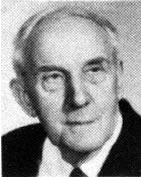 One honourable member who lamented the passage of travel by rail was Bert Herridge from Kootenay West in British Columbia. Not only did he regret the decline in rail travel by his colleagues, but as a representative of his constituents he was a ceaseless advocate for the retention of the Kettle Valley Railway.
One honourable member who lamented the passage of travel by rail was Bert Herridge from Kootenay West in British Columbia. Not only did he regret the decline in rail travel by his colleagues, but as a representative of his constituents he was a ceaseless advocate for the retention of the Kettle Valley Railway.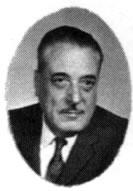 One of members from Vancouver, Harold Winch, who became a well-known figure on Parliament Hill, was also a former representative of the CFF who had made the successful transition to the NDP. He was at all times a doughty spokesman for his constituents, and possessed an amiable personality, liked by parliamentarians in all parties. He believed in the efficacy of friendly persuasion, especially when sharing a beverage with an adversary. That was during the years when "beverage" was the accepted term in straitlaced Ontario for spirituous liquor. "What beverage would you like?" was thought to be more socially acceptable than "What are you drinking?"
One of members from Vancouver, Harold Winch, who became a well-known figure on Parliament Hill, was also a former representative of the CFF who had made the successful transition to the NDP. He was at all times a doughty spokesman for his constituents, and possessed an amiable personality, liked by parliamentarians in all parties. He believed in the efficacy of friendly persuasion, especially when sharing a beverage with an adversary. That was during the years when "beverage" was the accepted term in straitlaced Ontario for spirituous liquor. "What beverage would you like?" was thought to be more socially acceptable than "What are you drinking?"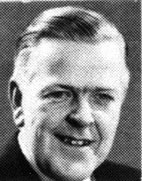 A third member from British Columbia who held a position of influence within the Progressive Conservative Party was the Hon. E. Davie Fulton. His political lineage was impressive. His grandfather and a great uncle both were Premiers of the Province of British Columbia, and his father had been an elected member of the House of Commons in Ottawa. He was a Rhodes Scholar at a time when that carried a certain cachet in Canada, and had served his country overseas during World War II, reaching the rank of Major.
A third member from British Columbia who held a position of influence within the Progressive Conservative Party was the Hon. E. Davie Fulton. His political lineage was impressive. His grandfather and a great uncle both were Premiers of the Province of British Columbia, and his father had been an elected member of the House of Commons in Ottawa. He was a Rhodes Scholar at a time when that carried a certain cachet in Canada, and had served his country overseas during World War II, reaching the rank of Major.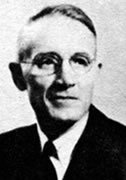
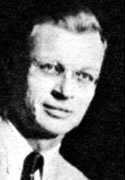
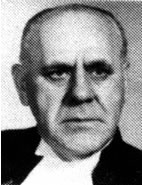 Herman Maxwell Batten, the Member for Humber-St. George's, was all that his name implied. A conscientious, hard working representative of his constituents and his province, he was a respected and well-liked backbencher who rose to become Deputy Speaker of the House in succession to Lucien Lamoureux, of whom more anon.
Herman Maxwell Batten, the Member for Humber-St. George's, was all that his name implied. A conscientious, hard working representative of his constituents and his province, he was a respected and well-liked backbencher who rose to become Deputy Speaker of the House in succession to Lucien Lamoureux, of whom more anon.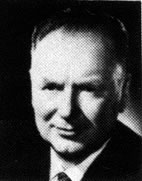 On becoming a Hansard reporter in the Commons, my first and most important task was to learn the names of the Members, and of their ridings. Much time was spent memorising faces and names, and spent well. I only had to hear the Speaker recognize the Honourable Member for Grand Falls-White Bay-Labrador when I knew the member's name was Granger, Charles Granger.
On becoming a Hansard reporter in the Commons, my first and most important task was to learn the names of the Members, and of their ridings. Much time was spent memorising faces and names, and spent well. I only had to hear the Speaker recognize the Honourable Member for Grand Falls-White Bay-Labrador when I knew the member's name was Granger, Charles Granger.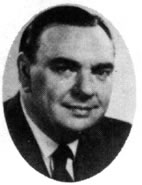 Unfortunately, Mr. Granger did not remain the member. A Mr. Don Jamieson became the new member, and in fact went on to become Secretary of State for External Affairs in one of Trudeau's cabinets. Round faced, roly poly, with bulbous eyes, he looked nothing like Mr. Granger, but forever linked for me was Granger with Grand Falls-White Bay-Labrador. Thus, whenever I had occasion to address the new member, who in time became an important Minister of State, I invariably used the name "Granger".
Unfortunately, Mr. Granger did not remain the member. A Mr. Don Jamieson became the new member, and in fact went on to become Secretary of State for External Affairs in one of Trudeau's cabinets. Round faced, roly poly, with bulbous eyes, he looked nothing like Mr. Granger, but forever linked for me was Granger with Grand Falls-White Bay-Labrador. Thus, whenever I had occasion to address the new member, who in time became an important Minister of State, I invariably used the name "Granger".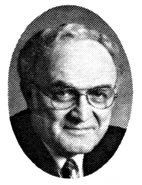 A fourth member from Newfoundland who rose to prominence in the House of Commons was the Honourable James McGrath. He, too, had a good speaking voice. His arguments were incisive, his thinking clear-headed, and his future promised rapid advancement. Regrettably that future never fully blossomed. As the Member for St. John's East he had the misfortune to have as the representative for St. John's West the charismatic John Carnell Crosbie, he of the ready tongue and quick quip.
A fourth member from Newfoundland who rose to prominence in the House of Commons was the Honourable James McGrath. He, too, had a good speaking voice. His arguments were incisive, his thinking clear-headed, and his future promised rapid advancement. Regrettably that future never fully blossomed. As the Member for St. John's East he had the misfortune to have as the representative for St. John's West the charismatic John Carnell Crosbie, he of the ready tongue and quick quip..jpg) The Hon. John Pickersgill, "Jumping Jack Pickersgill", Ontario born, Manitoba educated, and an outsider, represented the Newfoundland riding of Bonavista-Twillingate, and was first elected to the House of Commons in 1953. Prior to that he had spent fifteen years in the PMO (Office of the Prime Minister) in Ottawa, where he became private secretary to Mackenzie King, the Prime Minister regularly returned to office, general election after general election, with two exceptions, during the period 1921 to 1948.
The Hon. John Pickersgill, "Jumping Jack Pickersgill", Ontario born, Manitoba educated, and an outsider, represented the Newfoundland riding of Bonavista-Twillingate, and was first elected to the House of Commons in 1953. Prior to that he had spent fifteen years in the PMO (Office of the Prime Minister) in Ottawa, where he became private secretary to Mackenzie King, the Prime Minister regularly returned to office, general election after general election, with two exceptions, during the period 1921 to 1948.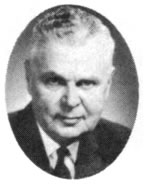 This may have coloured my first impression of John G. Diefenbaker as Prime Minister-that he lacked decisiveness. Later that impression was reinforced when he faced troubles within his cabinet. Reluctant to sack ministers, he allowed cliques to form, egos to grow, and cabinet members began to resign on what they considered matters of principle. Had he acted promptly, had he sacked one or two at the start, the traces would not have become tangled and he might have driven the coach of state for years, eyes front, and not looking over his shoulder to see who was seeking to throw him down.
This may have coloured my first impression of John G. Diefenbaker as Prime Minister-that he lacked decisiveness. Later that impression was reinforced when he faced troubles within his cabinet. Reluctant to sack ministers, he allowed cliques to form, egos to grow, and cabinet members began to resign on what they considered matters of principle. Had he acted promptly, had he sacked one or two at the start, the traces would not have become tangled and he might have driven the coach of state for years, eyes front, and not looking over his shoulder to see who was seeking to throw him down.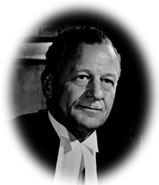 The serving Speaker when I became a member of the Hansard staff was the Honourable Roland Michener, an impressive figure in his Speaker's robes. That was during Diefenbaker's administration, a time when the Prime Minister had power to appoint whom he wished to the post.
The serving Speaker when I became a member of the Hansard staff was the Honourable Roland Michener, an impressive figure in his Speaker's robes. That was during Diefenbaker's administration, a time when the Prime Minister had power to appoint whom he wished to the post.